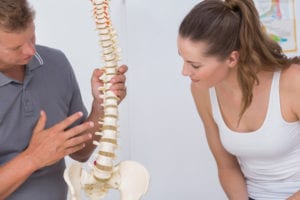 Often referred to as a slipped disc, a herniated disc is caused when the soft nucleus inside the center of a vertebra pushes through to the outside. This is a result from natural wear and tear or an injury. Many patients who experience a herniated disc report never noticing symptoms of this condition, while others explain back, leg, arm, and foot pain. Roanoke, TX chiropractor Dr. Cody Doyle non-surgically corrects herniated discs through musculoskeletal manipulation. After an extensive evaluation of your spine, Dr. Doyle will create an individualized treatment plan for you.
Often referred to as a slipped disc, a herniated disc is caused when the soft nucleus inside the center of a vertebra pushes through to the outside. This is a result from natural wear and tear or an injury. Many patients who experience a herniated disc report never noticing symptoms of this condition, while others explain back, leg, arm, and foot pain. Roanoke, TX chiropractor Dr. Cody Doyle non-surgically corrects herniated discs through musculoskeletal manipulation. After an extensive evaluation of your spine, Dr. Doyle will create an individualized treatment plan for you.
Rather than looking at the damaged section of the spine, Dr. Doyle considers the spine as a whole. He looks for signs of muscle loss or weakness, as well as checks the condition of your nerve paths through reflex testing. Your posture plays a large factor in his evaluation. At the end of your consultation, you can expect a detailed treatment plan for your herniated disc, along with a few suggested lifestyle changes.
What Causes a Herniated Disc?
The most common cause for a herniated disc is aging. As you grow older, the jelly-like nucleus inside each vertebra dries up. This is referred to as disc degeneration and causes weakness. Like many other medical conditions, smokers are believed to have a higher risk of disc degeneration because less oxygen reaches the disc, which results in faster degeneration.
Other risk factors include:
- Gender (men between 30 and 50 years of age)
- Improper lifting
- Weight (such as being overweight)
- Staying seated for long periods of time
Herniated Disc Symptoms
Most of the time, a herniated disc is asymptomatic. However, some patients report muscle spasms, muscle weakness, extremity numbness, and pain in the back, arms, feet, and legs.
A herniated disc is the most common cause for back pain and sciatica (leg pain). With proper pain management, most patients experience relief after a few weeks.
Non-Surgical and Surgical Treatments
There are many methods for treating herniated discs. Some patients find relief through NSAIDs (nonsteriodal anti-inflammatory drugs), such as Tylenol or Advil. Non-surgical treatment also includes physical therapy or an epidural steroid injection. Dr. Doyle recommends rest and relaxation, along with regular chiropractic care. If your herniated disc is severe, Dr. Doyle may recommend you to a surgeon, where you will receive a microdiskectomy.
However, most patients find pain relief through chiropractic treatments. The most common method that Dr. Doyle will perform is the flexion-distraction technique. During this procedure, a special table is used to stretch the spine, or distract it. This technique incorporates gentle rhythmic pumping to help the nucleus back into its intended position inside the vertebra. Patients don’t feel discomfort when undergoing this procedure.
Your detailed treatment plan will include the most appropriate method for pain relief, as well as recommendations on managing herniated disc discomfort at home. Dr. Doyle will suggest various lifestyle changes to reduce your risk of slipping another disc. He will also recommend ways to live a healthier life, such as implementing a diet enriched with fruits and vegetables and daily exercises to practice.
Call 817-767-5430 to schedule your chiropractic appointment with Dr. Doyle in Roanoke, TX.